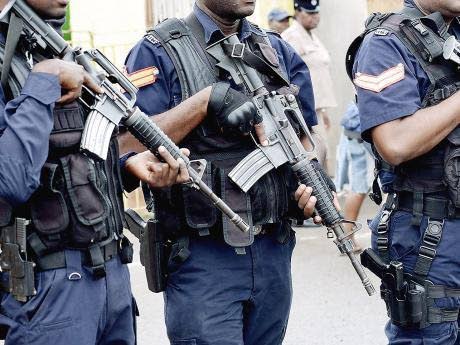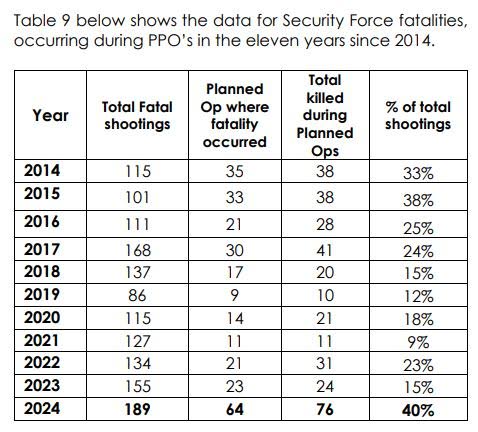'We will not be dictated to' - JCF fans off rights groups, state bodies demanding body cameras in planned ops
Loading article...
The Jamaica Constabulary Force (JCF) says it will not allow external groups to dictate how it deploys body-worn cameras (BWCs), even as public outrage intensifies over the controversial police killing of 22-year-old Jahmar Farquharson in Clarendon earlier this month.
“Let it be clearly stated: The JCF will not be dictated to by Jamaicans for Justice (JFJ), the Independent Commission of Investigations (INDECOM), or any other group, on matters of operational deployment of BWCs or any other internal operational strategies,” the force said in a statement posted to X on Saturday.
In its two statements since the September 15 killing of Farquharson, the JCF has not indicated a policy position on whether body-worn cameras will be made mandatory for planned police operations (PPO). The force is awaiting the delivery of 1,000 additional units.
INDECOM has argued that such missions account for the majority of fatal police shootings so far this year, which have spiked over last year.
According to the oversight body, 230 fatal shootings have been recorded between January 1 and September 25 - a 76 per cent increase compared with the similar period in 2024.
Deputy Commissioner of INDECOM Hamish Campbell has said body cameras could have been crucial in the Farquharson case, noting that none of the 23 officers on the raid at his Cherry Tree Lane home wore the devices.
A video circulating online shows Farquharson opening a door and raising his hands before police officers entered on a warrant searching for a gun. Officers later reported he was shot after allegedly pulling a gun inside his bedroom. A .38 revolver was seized, according to the JCF.
The Dr Kevin Blake-led police force has described the situation as “most regrettable” but insisted the facts must be “conclusively determined by an independent investigation.”
Saturday’s JCF statement argued that criticism of the BWCs rollout was misleading.
“Calls from various quarters for the mandatory use of BWCs falsely imply resistance from the JCF. Nothing could be further from the truth. The reality is that we cannot be mandated to use tools that we do not yet have,” it said, adding that logistical and financial constraints remain significant barriers.
“For several months, we have publicly acknowledged that the Force is actively engaged in the procurement of an additional 1,000 BWCs, a process that is lengthy and complex. Yet, rather than recognising this as an update in the spirit of transparency, some outlets have chosen to reframe this information as a response to public pressure. This is not only inaccurate, it is disingenuous,” the statement said.
The JCF conceded that the number of police fatal shootings was “unacceptably high”, saying "if we are serious about reducing police-involved fatalities, there are three clear options before us.
It listed the options as "reduce operational output to avoid armed confrontations", which it said is "not an option for a force tasked with public safety in a high-risk environment. It said the second option is to appeal to criminal elements to cease the use of deadly force against law enforcement.
"We call on INDECOM, JFJ, and all well-thinking Jamaicans to join us in this appeal. It is dangerous to trivialise our sincerity on this matter. If criminals remain convinced that deadly confrontations will earn them sympathy while police actions are continually misrepresented, the cycle of violence will persist," the force said.
The third option, according to the JCF, is to "investigate each fatal encounter thoroughly and hold members accountable if found to have acted unlawfully". The force said "we fully support" that option.
The JCF argued that “the third point assumes that many police shootings are unjustified, despite the overwhelming majority of INDECOM’s investigations ending with officers being cleared of wrongdoing."
"The JCF supports every lawful investigation. We remain committed to accountability, transparency, and justice. This is the mature posture of a force committed to modernisation, not a force resisting change. We invite all stakeholders to engage with the facts, appreciate the complexity of operational policing in Jamaica, and collaborate meaningfully in the national interest," the statement added.
The JCF also stressed: “The limited deployment of BWCs is not due to a lack of will or reluctance on the part of the JCF. Rather, it reflects the logistical and financial realities of equipping over 8,000 frontline personnel. The JCF neither controls the procurement process nor the allocation of the Government’s financial resources.”
Meanwhile, rights groups such as JFJ and Stand Up For Jamaica and the Office of the Public Defender, a state body, have echoed INDECOM’s call for cameras to be mandatory on planned raids.
National Security Minister Dr Horace Chang last year downplayed the technology’s usefulness in violent confrontations, saying its “primary benefit” was in managing public order.
He insisted that the police must defend themselves against armed attacks and pointed to a force that is more intelligence-driven due to increased investments in the training of officers and provision of resources.
The JCF disclosed last week that procurement for an additional 1,000 body-worn cameras has been completed, with delivery expected in the coming weeks.
INDECOM reported a sharp escalation in fatalities arising from planned police operations last year, describing the increase as “enormous.” According to the oversight body, “2024 has witnessed an enormous increase in fatalities arising out of the JCF’s PPOs. It is unknown whether the number of PPO’s conducted by the JCF in 2024 increased, but PPOs, where persons were shot and killed, amounted to 40% of total security force fatalities in 2024. Seventy-six (76) men were killed from sixty-four (64) PPOs.”
This represents the highest proportion of such deaths since monitoring began in 2013.
The commission highlighted that in the second half of 2024 alone, 53 men were killed in 42 PPOs, compared with 23 fatalities in 22 operations in the first half of the year. Yet, despite the spike, “in just one PPO incident was a Body Worn Camera fitted to a single officer… [but] the camera was not activated,” INDECOM noted.
The agency told Parliament that “the failure to introduce the wearing of BWCs during planned policing operations has become unfathomable and untenable,” insisting that such operations demand urgent deployment of the technology to safeguard lives, bolster transparency, and restore public trust.
Jamaica has seen a record decline in murders of more than 40 per cent so far this year compared with the similar period last year.
“Not once this year has anybody worn a body-worn camera during a planned police operation,” said Deputy Commissioner Campbell last week in an update on Farquharson's case.
“We do keep repeating the same message, because here is perhaps an example where CCTV evidence exists, but body-worn cameras would have supported the police and reinforced what they report to us.”
Follow The Gleaner on X and Instagram @JamaicaGleaner and on Facebook @GleanerJamaica. Send us a message on WhatsApp at 1-876-499-0169 or email us at onlinefeedback@gleanerjm.com or editors@gleanerjm.com.

